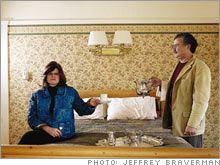Yes - if they can find an inn that's already profitable. Though there are some 20,000 B&Bs and inns in the U.S., the successful ones aren't often for sale.
"Most of the properties listed have serious problems," says Howard Levitan, an owner of the Oates & Bredfeldt inn-keeping school. He suggests they start with a location they'd like to live in, and when they find an inn they like, estimate its net cash flow.
This can be calculated using occupancy rate (which they can get by asking around), number of rooms and the average daily rate.
If it looks promising, approach the proprietor. The average tenure of an inn owner is eight years, Levitan says, so they might catch someone looking to get out.
Before buying, they must analyze the books to ensure its inn's revenue covers its expenses. Doing so will help them avoid having to tap their assets.
"But they still have a few areas where they need to protect themselves," says Fresno financial planner Mark Prendergast. He says the couple should get life and disability insurance and shop for health insurance before leaving their jobs.
Once they do quit, they should take advantage of the drop in income to convert IRAs to Roth IRAs, which will give them tax-free income after age 591/2.
And just in case they find the hospitality biz isn't as rewarding as they'd hoped, he advises, they might want to keep up their contacts in the hospital biz. Art and Marta are already putting all of this advice into practice.
After finding that inns in the Pacific Northwest tend to lose money because of a short tourist season, they're now looking in New Hampshire, which has a nearly year-round market. "We want to have fun, but we still need to support ourselves," says Art.
| The 'R' moment looms closer than ever, but if you get serious now, you can still catch the magic bus. (more) |

